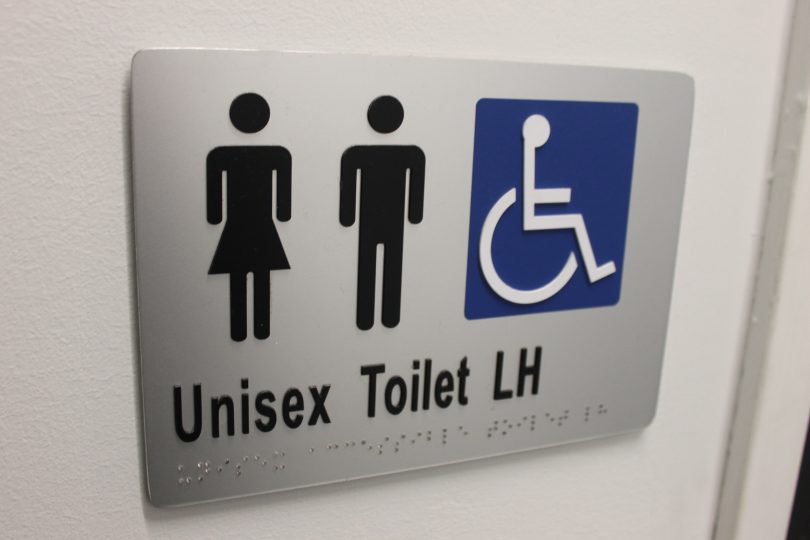RMIT University has introduced gender neutral bathrooms to the New Academic Street (NAS) precinct following a student union campaign.
New gender neutral toilets are available on level three, five and seven of NAS.
The RMIT University Student Union (RUSU) queer department campaign first started calling for a safe and comfortable space for trans and gender diverse people to go to the toilet in 2015.
Log in or sign up to view
See posts, photos and more on Facebook.
RMIT University manager equity and diversity Lara Rafferty said introducing gender neutral toilets was about ensuring facilities were inclusive for all.
“Ensuring RMIT is a safe, inclusive and welcoming space for all people, students and staff means we provide toilet facilities for everyone,” she said.
“It is a basic human right that when you need to pee you can comfortably pee.”
Around 50 gender neutral bathrooms are available across all RMIT University campuses. The new gender neutral bathroom facilities at NAS are the first full gender neutral toilet blocks on campus. Around 50 single cubicle toilets were re-signed gender neutral over the past few years.
Being forced to use a male or female bathroom can present an uncomfortable dilemma for trans and gender diverse students.

RMIT University student Ray Adcock sits in an RMIT University building. They said they were excited to use new gender neutral bathroom facilities in RMIT’s New Academic Street. Picture: Rochelle Kirkham.
RMIT University student Ray Adcock said it was difficult using a gendered bathroom.
“I hate going into the female toilets and I don’t pass as a man so I never go into them,” they said.
“I get reminded every time I go in there that people see me this way. I hate being reminded of that.
“Sometimes I can just block out the fact that there is a female sign on the door, but often it is blaring. People love to colour spaces. I went to a bathroom in RMIT and it was all pink inside. You don’t need to remind me that my bits are female, it is awful to be reminded.
“I actually used the male toilets for the first time while sober two weeks ago and it was fantastic, although while I was on the toilet somebody came in. I was like ‘no, don’t come in, I can’t have other people in here, just get out so I can leave without anybody knowing I am in here’. But that was really affirming to even be able to use the male toilets.
“It feels even better in a gender neutral toilet where I can not have that anxiety when people come in and think ‘shit, I’ve just got to sit on the toilet until they leave’.”
Transgender Victoria executive director Sally Goldner said it was important for universities in particular to embrace gender neutral bathrooms.
“Having some flexibility gives trans and gender diverse people some comfort,” they said.
“It has huge consequences for people if these facilities aren’t available. It can lead to things like assault.
“Many trans and gender diverse people may not go to the bathroom if they are on campus all day. That can have affects physically and psychologically as well. It is just that constant stress factor that ‘if I don’t look like societies expectations of a certain gender where am I going to go?’.”

A single stall gender neutral bathroom at RMIT University. Only single stall gender neutral toilets were available before the introduction of bathroom blocks to New Academic Street. Picture: Rochelle Kirkham.
RMIT University’s LGBTIQ Inclusion Plan aims to recognise and welcome diverse sexualities and genders and allow staff and students to be free to be themselves at work and study.
A current university wide survey invites students and staff to share their experiences at RMIT as the wellbeing team continue to build on their action plan.
Responses to a similar survey conducted in 2016 detailed the experiences of LGBTIQ staff and students.
A number of respondents recommended RMIT increase the visibility of its commitment to LGBTIQ inclusivity, the 2016 survey summary report stated.
“Specific recommendations included posters that promote RMIT as a queer-friendly place to work and study, more diverse representation of gender and sexuality in university publications, running and/or promoting inclusive events, and a strong communications strategy to support the implementation of the inclusion plan,” the report stated.
“A simple rainbow on the corner of a flyer […] could mean so much to a prospective student,” one survey respondent wrote.
Ms Rafferty said early responses to the current survey showed students and staff reporting a more inclusive and safe environment.
“We also need to be aware that maybe there are still some experiences that aren’t so positive,” she said.
“We don’t expect to change society over night and there are still experiences and behaviours happening that we don’t want to see here.”
RMIT University student Emmanuel Arnold said RMIT’s efforts to welcome and support LGBTIQ people were not clearly visible to students.
“They talk about it but you walk through the uni and it is not visible,” they said.
“It would be great to just see a poster or something to feel like we are welcome.”
Why we need gender-neutral bathrooms | Ivan Coyote
There are a few things that we all need: fresh air, water, food, shelter, love … and a safe place to pee. For trans people who don’t fit neatly into the ge…
The new developments at RMIT University follow student campaigns calling for gender neutral bathrooms at higher education institutions across the state.
Swinburne University was the first in Victoria to introduce gender neutral bathrooms in 2014.
Swinburne University queer officer Joshua Briers said gender neutral bathrooms have extended the number of safe spaces on campus.
“I think everyone who has used them has felt very comfortable. I know I felt very comfortable using them and I know everyone in the queer space feels comfortable using them,” he said.
“But actually for most students it has had a negligible impact. No one has noticed, no one cares, but that is actually the beauty of it. It affects the students that it needs to in a momentous way and it affects most of the student population in a way that they don’t even notice, but it’s changed their attitudes. If you’re used to a gender neutral bathroom at uni you’ll be used to it at work.”
Melbourne University, LaTrobe University, Victoria University, Federation University and Monash University have since introduced gender neutral bathrooms to student campuses.
Deakin University is looking to follow the trend with a recent student association campaign proposing gender neutral bathrooms across university campuses.
The Deakin University Student Association gender neutral bathroom proposal calls for all existing gendered single-stall toilets be re-signed to be accessible to all genders. It also proposes select gendered multi-stall toilets be re-signed to cater for gender diverse students and staff.
If you have experienced sexual harassment or assault you can report it to the police, or to call the National Sexual Assault, Domestic and Family Violence Counselling Service on 1800 RESPECT.



